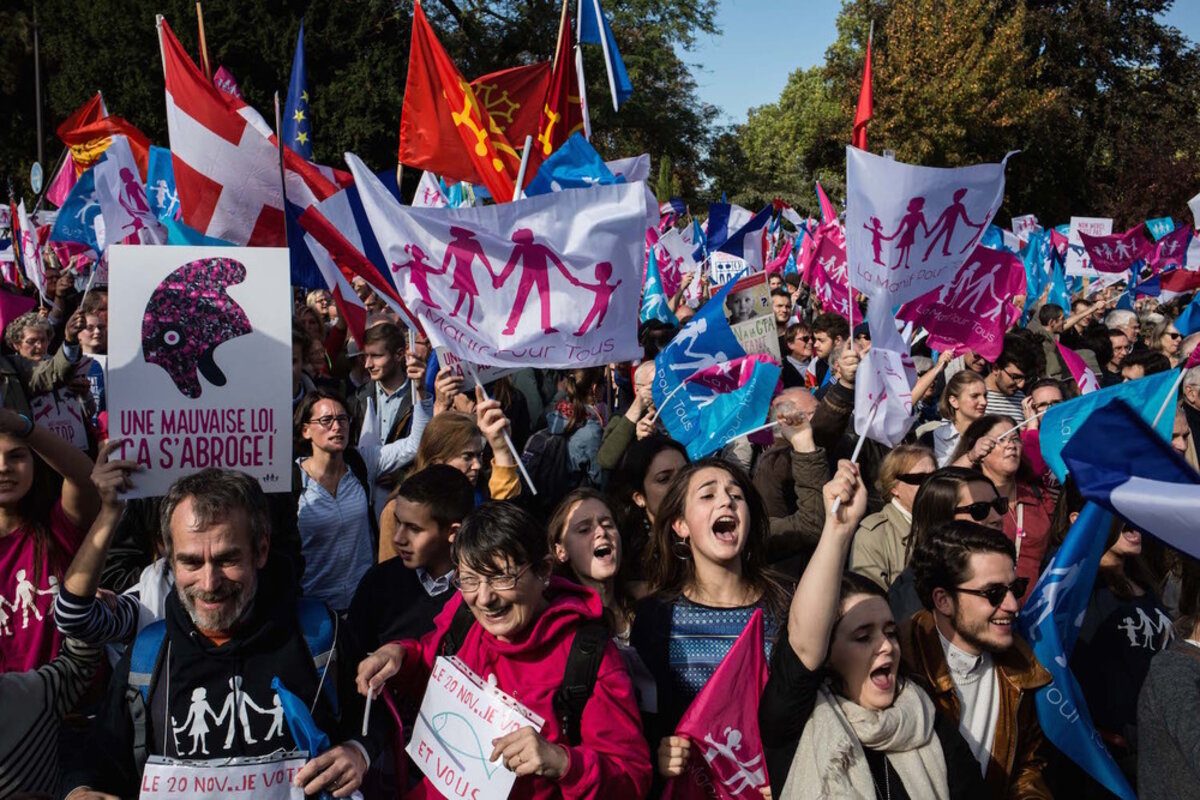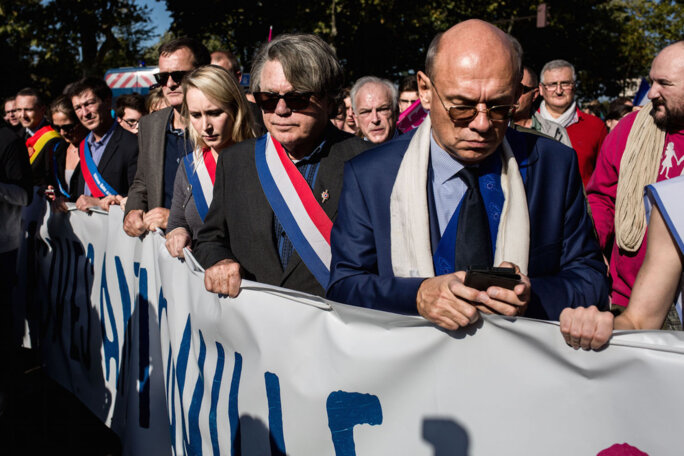A month before the ‘Manif Pour Tous’ demonstration in Paris on Sunday (see news report of the event here), which was a test of the continuing strength of a movement that, beginning in 2012, brought hundreds of thousands onto French streets to protest against France’s same-sex marriage bill, the US-based World Congress of Families held what it called a “regional conference” in the Serbian capital of Belgrade. The agenda of the conference, which was attended by key figures of the ‘Manif Pour Tous’ movement, included talks on themes that are dear to those who demonstrated in Paris this weekend, such as: “Totalitarianism of LGBT ideology”, “Natural family is the key to resolving major problems of humankind”, “The European Union against families and traditional values”, and “The demographic winter and the moral decline of the West”.
“We are witnessing a growing coordination at a European level in order to build a new strategy,” said Julie Pernet, a policy advisor on issues regarding women’s rights and LGBT rights with the European Humanist Federation, a Brussels-based NGO that promotes a secular Europe.

Enlargement : Illustration 1

“Across Europe, we find the same names, the same types of arguments, the same slogans, the same logos,” said Neil Datta, Secretary of the European Parliamentary Forum on Population and Development, a network of European Members of Parliament who support women’s free choice over abortion and contraception. “Which allows us to say that the demonstration on October 16th will be the beginning of a mobilization that will be much larger. Their aim is to weigh on the coming [2017 French presidential] elections.”
Datta believes the operating mode of the “Manif Pour Tous’ and other similar movements across Europe is increasingly harmonized. In France there will be well-publicised demands (the movement has posted its propositions online), public demonstrations, internet campaigns during which the presidential candidates will be given scores for their support, or not of, of the movement’s policies.
At a European level, the movements against abortion rights, same-sex marriage and the right for homosexual couples to adopt, managed to lobby right-wing MEPs and successfully scupper a European Parliament resolution promoting the rights of women to abortion, and in 2014 attempted - but failed - to sink another resolution setting out a roadmap for “the protection of the fundamental rights of LGBT individuals”. Certain targeted MEPs were bombarded with emails by people who were apparently following an organised procedure.
The lobbyists are increasingly using the internet. A website called CitizenGo, founded in Spain in 2013, is a militant organization that notably opposes abortion, same-sex marriage and euthanasia and which specializes in internet activism with the organization of online petitions. A French-based movement, called ‘Un de nous’ (One of Us), which describes itself as “a federation of European associations for life and human dignity”, recently attracted nearly two million signatures for a petition lobbying for an end to financing of European research programmes “leading to the destruction of human embryos”.
The spokeswoman for France’s 'Manif Pour Tous', Ludovine de La Rochère, has travelled across Europe to meet with allied movements, including in Croatia, Germany, Finland and Ireland. But these allied movements differ in their demands according to the political agenda of the country where they are based. “From one country to another, the issues at stake can change,” commented David Paternotte, a lecturer in sociology at the Brussels Free University specialised in same-sex marriage issues and the opposition to LGBT activism. “In certain countries, the accent is placed on sexual education, in Belgium it is on euthanasia. But the movements look at each other. One shouldn’t succumb to the idea of a plot. There is no office, somewhere in Rome or elsewhere, which coordinates these movements.”

Enlargement : Illustration 2

Meanwhile, observed Neil Datta, a coded language is used in place of religious rhetoric or homophobic slogans in order to reach out wider, with phrases such as “the superior interest of the child” or “the respect for life” on issues of abortion, or adoption by same-sex couples. “There is a professionalization of the actors whose vocabulary is more subtle, and more difficult to unmask, to enlarge their audience,” said Datta.
While it was the hierarchy of the Catholic church which was at the head of the mobilisation in Spain in 2005 against the adoption by parliament of a bill legalising same-sex marriage, and which in itself widely irritated lay opinion, the French opponents of the same-sex marriage law chose to present their movement as a spontaneous event led by citizens. But the Vatican nevertheless remains a highly influential force, as witnessed by Pope Francis’s recent declarations criticizing a supposed teaching in French schools of gender schema theory (that argue that differences between the sexes are largely constructed). “The talk about gender theory was formed 20 years ago in the Vatican following United Nations conferences, [like] that in Cairo dedicated to ‘sexual and reproductive rights’ and that in Beijing on ‘gender’,” said sociologist David Paternotte. But more directly, the ‘Manif Pour Tous’ movement has been given influential help from leading French ecclesiastics. “We know that cardinal André Vingt-Trois and [archbishop of Lyon] monsignor Barabarin made available their networks during the major demonstrations against the Taubira law [for same-sex marriage],” added Paternotte.
The loose alliance to which the ‘Manif Pour Tous’ belongs also benefits from the support of US organizations such as the American Center for Law and Justice. The Washington-based Christian and right-wing group, founded in 1990, has also created a European Center for Law and Justice, based in the eastern French city of Strasbourg, which is also home to the European Parliament, and a Slavic Center for Law and Justice, both of which lobby against homosexuality and in favour of conservative Christian values. The New Jersey-based National Organization for Marriage, founded in 2007 to oppose same-sex marriage legislation across the states of the US, has also established direct ties with leaders of the 'Manif Pour Tous, and is suspected of giving logistical support to other such groups in Europe.
The Paris-based Fondation Jérôme-Lejeune, which is one of the foremost anti-abortion and anti-euthanasia campaigning organizations in France, for which Ludovine de La Rochère was previously head of communications, has a representation office in the US. A US communications firm OPUSfidelis, specialized in online and social media strategies, founded by CEO David Lejeune, was active in the French campaigns opposing same-sex marriage.
Meanwhile, in Russia, Alexey Komov, who is the head of international affairs for the St. Basil-the-Great Foundation, the country’s largest private foundation, makes no secret of the support it gives to European organizations and associations campaigning against same-sex marriage, against abortion and euthanasia. Komov, who also acts as an ambassador for the like-minded US-based World Congress of Families, was present at the WCF’s congress in Belgrade last month alongside Brian S Brown, president of the National Organization for Marriage (whose motto is “Protecting Marriage and the Faith Communities that Sustain It”). Komov was a key guest at a round table discussion organised two years ago by the Paris-based Confédération des Associations Familiales Catholiques, entitled “If you want peace, defend the family”.
“Russia is undoubtedly the only country among the world’s great powers to have the necessary courage, determination and rigour to protect family values,” Komov said in an interview about the round table debate with the website l'Observatoire Russe (The Russian Observer).
Also present at last month’s congress in Belgrade was Fabrice Sorlin, the French representative for the World Congress of Families. Sorlin, who once stood as a candidate for the far-right Front National party in parliamentary elections in France, has good relations with Russian oligarch and ally of President Vladimir Putin, Konstantin Malofeev, president of the St Basil-the-Great Foundation, with whom Komov is close.
-------------------------
- The French version of this article can be found here.


